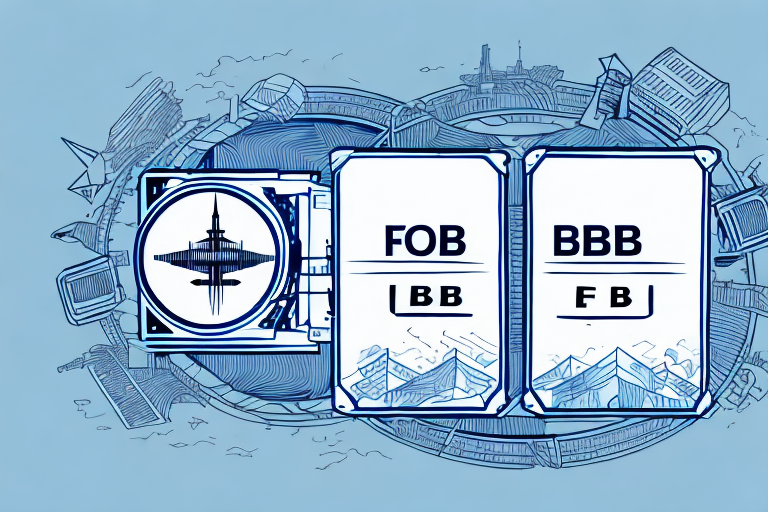Introduction to FOB Invoices
If you're involved in international trade, you've probably heard the acronym FOB thrown around. FOB stands for Free On Board, and it's a term used to describe a particular type of shipment contract. In this article, we'll explore the fundamentals of FOB invoices and everything you need to know about them.
Understanding FOB Terms
What is an FOB Invoice?
An FOB invoice is a document that outlines the terms and conditions of a specific type of shipment contract known as Free On Board. In this contract, the seller is responsible for delivering the goods to a designated location, typically the port or airport of departure. Once the goods are loaded onto the shipping vessel, the buyer assumes responsibility for the shipment and any associated costs or risks.
FOB invoices are commonly used in international trade, where the buyer and seller may be located in different countries and the transport of goods may involve various modes of transportation. By outlining the responsibilities of each party, an FOB invoice can help prevent misunderstandings and disputes.
FOB Shipping Point vs. FOB Destination
- FOB Shipping Point: The seller is responsible for the goods until they are loaded onto the shipping vessel or other mode of transportation.
- FOB Destination: The seller is responsible for the goods until they reach the designated destination.
The specific responsibilities under each term can vary depending on the agreement between the buyer and seller. However, generally, the seller handles packing, documentation, and transportation to the designated location, while the buyer covers costs like freight charges, customs duties, and insurance.
It's important to note that FOB terms apply primarily to goods transported by sea or inland waterway. For other transportation modes, such as air or land, different terms like CIF (Cost, Insurance, and Freight) or EXW (Ex Works) may be used.
The Importance of FOB Invoices in International Trade
FOB invoices are essential in international trade because they provide a clear understanding of each party's responsibilities. By outlining the terms and conditions of the shipment contract, FOB invoices help prevent misunderstandings and disputes between buyers and sellers. They also serve as a useful record for accounting purposes and can facilitate payment and financing arrangements.
Additionally, FOB invoices can be used as legal documents in case of disputes or legal proceedings. They provide evidence of the agreed-upon terms, which can be crucial for resolving conflicts. Furthermore, FOB invoices help ensure compliance with customs regulations and other legal requirements, which can vary from country to country.
Calculating Freight Charges for an FOB Shipment
Factors Influencing Freight Costs
Calculating freight charges for an FOB shipment involves several factors:
- Weight and Volume: Heavier and bulkier goods typically cost more to transport.
- Mode of Transportation: Sea freight is usually cheaper than air freight but takes longer.
- Distance Traveled: Longer distances increase transportation costs.
- Additional Services: Insurance, customs clearance, and special handling can add to the cost.
Steps to Calculate Freight Charges
- Obtain quotes from multiple carriers to compare rates.
- Consider the reliability and reputation of each carrier.
- Negotiate with carriers for better rates or terms if possible.
- Factor in packaging costs, especially for fragile or oversized items.
- Account for potential delays or unexpected costs, such as customs delays or weather-related issues.
Utilizing freight calculators and consulting with freight forwarders can also aid in obtaining accurate estimates. For more detailed guidelines, refer to resources from the International Chamber of Commerce.
Advantages and Disadvantages of Using FOB Invoices
Advantages
- Clarity of Responsibilities: Clearly defines the responsibilities of buyer and seller, reducing the risk of disputes.
- Cost Control: Buyers have greater control over transportation costs and can negotiate better rates.
- Legal Protection: Serves as a legal document in case of disputes.
Disadvantages
- Complexity: Negotiating FOB terms can be complex and may require expertise.
- Potential Costs: Buyers may face unexpected transportation costs if not properly calculated.
- Limited Applicability: FOB terms are primarily applicable to sea and inland waterway transport, limiting their use for other modes.
Best Practices and Tips for Using FOB Invoices
Negotiating Better FOB Terms
If you're a buyer looking to negotiate better FOB terms with suppliers, consider the following tips:
- Be Clear About Requirements: Clearly communicate your requirements regarding destination, transportation mode, and delivery timelines.
- Negotiate Price and Terms: Don't hesitate to negotiate on price and other terms to achieve a mutually beneficial agreement.
- Have a Contingency Plan: Prepare for potential delays or unexpected costs by having a backup plan in place.
Avoiding Common Mistakes
When using FOB invoices, avoid the following common mistakes:
- Lack of Understanding: Ensure you fully understand the specific terms and conditions of the FOB contract.
- Incomplete Documentation: Obtain all necessary documentation and permits to avoid legal complications.
- Underestimating Costs: Accurately calculate all transportation costs, including hidden fees, to prevent budget overruns.
Best Practices for Preparing and Issuing FOB Invoices
To ensure a successful transaction and avoid disputes, follow these best practices when preparing and issuing FOB invoices:
- Clear and Specific Terms: Clearly outline all terms and conditions of the contract.
- Accurate Documentation: Include all necessary documentation and permits required for international shipments.
- Reliable Partners: Work with reputable carriers and freight forwarders to ensure smooth transportation.
- Maintain Records: Keep accurate records of all transactions for accounting and legal purposes.
- Effective Communication: Communicate clearly and promptly with all parties involved to address any issues that arise.
The Role of Freight Forwarders in FOB Shipments
Freight forwarders play a crucial role in FOB shipments by coordinating various aspects of transportation, such as booking cargo space, arranging customs clearance, and providing insurance coverage. Working with a reliable and experienced freight forwarder can help ensure a smooth and successful transaction. For more information on selecting a freight forwarder, visit the Freightos Guide.
Key Considerations When Choosing Between Different FOB Terms
When deciding between different FOB terms, consider the following factors:
- Type of Goods: Some goods may require special handling or packaging, influencing the choice of FOB terms.
- Distance and Transportation Mode: The distance and mode of transportation can affect costs and risks associated with different FOB terms.
- Risk and Responsibility: Assess which party is willing to assume more risk and responsibility during the shipment process.
- Legal and Regulatory Requirements: Ensure compliance with all legal and regulatory requirements in both the exporting and importing countries.
- Cost Efficiency: Evaluate the overall cost implications of each FOB term to determine the most cost-effective option.
The Future of FOB Invoicing in a Globalized Economy
In an increasingly globalized economy, FOB invoicing remains a critical tool for facilitating international trade. As technology advances, we may see new innovations in how FOB invoicing is implemented, such as the use of blockchain for greater transparency and efficiency. However, the fundamental principles of clear communication and clearly defined responsibilities are likely to remain essential.
For insights into the future trends of international shipping, refer to reports from the World Bank on Trade and Logistics.
Case Studies: Real-Life Examples of FOB Invoicing
Successful Use of FOB Invoicing
In a successful FOB transaction, a manufacturer in China used an FOB invoice to clearly define responsibilities with a distributor in Germany. This clarity helped prevent disputes and ensured timely delivery, resulting in a strong business relationship and repeat orders.
Failed Use of FOB Invoicing
Conversely, a misunderstanding of FOB terms led to a dispute when a supplier in Brazil failed to arrange proper documentation, causing delays and additional costs for the buyer in Canada. This case highlights the importance of thorough understanding and clear communication when using FOB invoicing.
By learning from both successful and unsuccessful examples, businesses can better understand the benefits and limitations of FOB invoicing and apply best practices to their international trade transactions.
Conclusion
In summary, FOB invoicing is a fundamental component of international trade, providing a clear framework for the responsibilities and obligations of both buyers and sellers. By outlining terms clearly, FOB invoices help prevent disputes, facilitate smooth transactions, and ensure compliance with legal requirements. However, it's crucial to understand the complexities involved and to work with reliable partners to manage risks effectively.
By adhering to best practices, utilizing reputable freight forwarders, and learning from real-life case studies, businesses can leverage FOB invoicing to enhance their operations in the global marketplace.






















